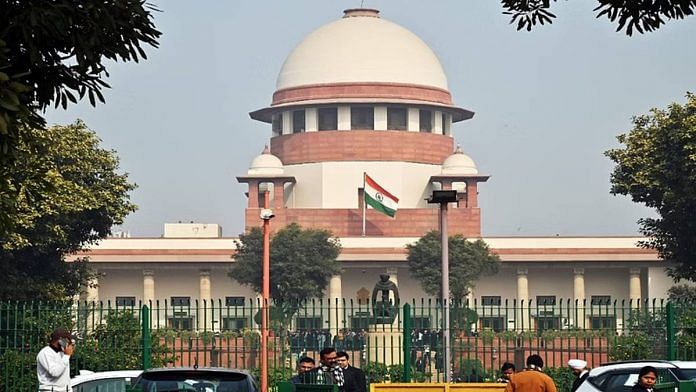New Delhi: Can multiple consumers with the same interest file a joint lawsuit under the Consumer Protection Act, 1986, instead of authorising a representative to act on their behalf as laid down by the law? Yes, says the Supreme Court.
In an order that’s likely to make such lawsuits significantly simpler, the Supreme Court Monday ruled that a “consumer” under the Consumer Protection Act means “consumers”.
It also said that “similarly placed complainants (who) jointly make a complaint seeking the very same relief” can seek redressal without going through the procedure laid down by the Code of Civil Procedure, 1908 — a requirement in the consumer law.
Order 1 Rule 8 of the Code of Civil Procedure (CPC) makes a provision for one person to represent others in cases where there are multiple people having the same interest in the suit.
The court was hearing a lawsuit by Alpha G184 Owners Association, a group of house allottees who were suing Delhi-based construction firm Magnum International Trading Company Pvt Ltd for failing to complete the construction of a housing project within the promised time.
In its ruling, a division bench of Justices J.K. Maheshwari and M.M. Sundresh said that in cases where there were multiple consumers with the same interest, “there is no question of Order I Rule 8 CPC being complied with as they do not represent the others, particularly when there is no larger public interest involved”.
“Such complainants seek reliefs for themselves and nothing beyond,” the bench said, reiterating earlier judgments that held that consumers having similar interests can file a joint complaint instead of filing it in a representative capacity under the provisions of the CPC.
In doing so, the court asserted that the Consumer Protection Act, 2019, is meant to “encourage consumerism in the country”, and both this law as well as the 1986 iteration have a “laudable objective”.
“Any technical approach in construing the provisions against the consumer would go against the very objective behind the enactment,” the court said.
Also Read: Only 4 of 28 state consumer bodies at full strength, SC says ‘completely unacceptable’
The complaints
In 2017, the allottees approached the National Consumer Disputes Redressal Commission (NCDRC) as an association but along with individual affidavits.
In response, the construction firm filed a complaint with the district registrar of societies, alleging that the aims and objectives of the association did not conform to the Haryana Registration and Regulation of Societies Act, 2012.
While the proceedings on the builder’s complaint were flitting between the state registrar in Haryana, the registrar general in Haryana, and the Punjab and Haryana High Court, the NCDRC adjourned the proceedings before it in November 2019 sine die.
The registrar and registrar general are statutory bodies that register and regulate societies — including housing societies.
In 2021, the association filed a writ petition before the Punjab and Haryana High Court against certain adverse orders passed by the Haryana registrar and the registrar general. This petition is still pending in court, which last heard the case in March this year.
Meanwhile, last year, the NCDRC adjourned all cases related to the association before it, saying that the case was still pending before the high court.
It was this, as well as several other orders passed by the NCDRC, that the association was challenging before the Supreme Court — it argued that the builder was using such tactics to prevent the flat allottees from seeking legal recourse.
On his part, the builder submitted that the association’s registration was non-existent and that, as a result, its complaint is not maintainable.
‘Broader, exhaustive and inclusive interpretation’
Section 2(1)(b) of the Consumer Protection Act of 1986, under which the complaints had been filed in the NCDRC, defines the word “complainant”.
The Consumer Protection Act of 1986 under Section 2(1)(b)(i) defines “complainant” as including a consumer. Meanwhile, Section 2(1)(b)(iv) of the law says a “complainant” includes one or more consumers, where there are numerous consumers having the same interest.
In case of the latter, the consumers need to file an application under Order I Rule 8 of the Code of Civil Procedure, 1908, and go through the procedure under that provision, according to Section 13 (6) of the law.
In its ruling, the Supreme Court observed that the definition is “illustrative” and requires a “broader, exhaustive and inclusive meaning and interpretation”.
Rejecting the builder’s argument, the apex court allowed the appeals, saying that “consumer” under Section 2(b)(i) of the 1986 Act will include “multiple consumers”, and that “the issue pertaining to registration and the byelaws has got no relevance” to the case.
The bench said “the members of the appellant, who had filed the affidavits, would fall under Section 12(1)(a) of the 1986 Act”. It also noted that individual allottees had filed affidavits before the NCDRC and that the cases had not progressed even after five years.
The Supreme Court’s order clears the deck for the NCDRC to start hearing the association’s complaints.
(Edited by Uttara Ramaswamy)
Also Read: 70% consumers unhappy with Delhi HC stay on rule restricting service charge at eateries — survey



